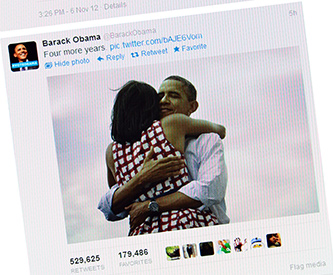The Facebook Effect

Jayeon “Janey” Lee, assistant professor of journalism and communication, studies the influence of social media on politics and news consumption
For the countless people who receive most of their news from social media feeds, those Facebook and Twitter posts are providing far more than information. The social nature of Facebook, for example, allows users to not only learn the news, but also see the reactions of a wide range of individuals to what they are reading—a feature that can shape how users perceive news.
Jayeon “Janey” Lee, assistant professor of journalism and communication, studies social media users' impression formation and strategic self-presentation in the context of political communication and journalism. Two of Lee’s studies examine how Facebook posts influence young voters’ impressions of political candidates, potentially pointing the way toward a more sophisticated use of social media by political parties. A third study examines the impact of journalists’ social media activities on perceptions of the news they report.
Prior to joining Lehigh, Lee was a staff writer at The Chosun Ilbo, a national newspaper with the largest circulation in Korea, and a guest TV and radio reporter for multiple media channels. Lee shared her thoughts on social media and how we share news today.
YOU'VE RECENTLY COMPLETED STUDIES ON THE INFLUENCE OF SOCIAL MEDIA ON PERCEPTION, ATTITUDES AND BEHAVIORS. WHAT DREW YOU TO THIS AREA OF RESEARCH?
I became interested in studying social media because that is the channel through which people increasingly consume information and communicate with one another. I wanted to investigate how the social media environment, which is different from traditional mass media environment, influences audiences’ perception, attitudes and behaviors.
WHAT CHANGES HAVE YOU OBSERVED IN HOW PEOPLE CONSUME THE NEWS?
Many young people accidentally get news through social media posts or by following media/journalists without subscribing to physical papers or magazines.
YOU HAVE STUDIED THE IMPACT OF SOCIAL NETWORKING ON VOTER PERCEPTIONS. HOW DO YOU SEE IT IMPACTING FUTURE ELECTIONS?
Young people are known to have little interest in politics and few regularly read newspapers or watch TV news. Most of them get their daily dose of news from their social media feeds. Thus, it is very important to understand how young people gather information or cues from social media to make sense of the world. For example, unknown other users' comments and their profile pictures can strongly affect audiences' perceptions of news or others. It has been found that those candidates who gain popularity are more likely to win an election. This trend is likely to continue in the future elections while political actors will try to utilize the power of social media more strategically. Social media which give more power to users (audiences) than traditional mass media will bring changes in election dynamics in the sense that not only news providers but also users can add and change information.
HOW HAVE SOCIAL NETWORKING SITES INFLUENCED PERCEPTIONS AND THE DISSEMINATION OF INFORMATION ABOUT RECENT EVENTS IN FERGUSON, MISSOURI, AND NEW YORK CITY?
I have not done research about Ferguson, but it seems new media have opened up a new door for minority representation. In particular, social media can give opportunities for the powerless or marginalized to get their voices out there in society. One of the biggest differences of social media from traditional mass media is that users are no longer passive receivers but creators, producers and disseminators of information. Also, social media communication has both mass communication and interpersonal communication components. These features of social media, combined with the power of visual tools such as photos and videos, allow social media to be effective in sharing and spreading news among people, including those who do not closely follow news. I think those features helped raise awareness of recent events in Ferguson and New York.
TWITTER AND FACEBOOK ALLOW ANYONE TO REPORT OR RESPOND TO NEWS EVENTS. DOES THE INFLUENCE OF SOCIAL MEDIA AFFECT OUR FACTUAL UNDERSTANDING OF THE NEWS?
There are various influences of the media channel or the features and users of the media on our understanding of news. However, I cannot give a yes or no answer to the question without testing. One thing I can say is that not all information transmitted through social media is accurate and balanced because there are no gatekeepers or multiple editors on the sites. However, the feedback and sharing features can help users correct or counter inaccurate information.
Posted on:

